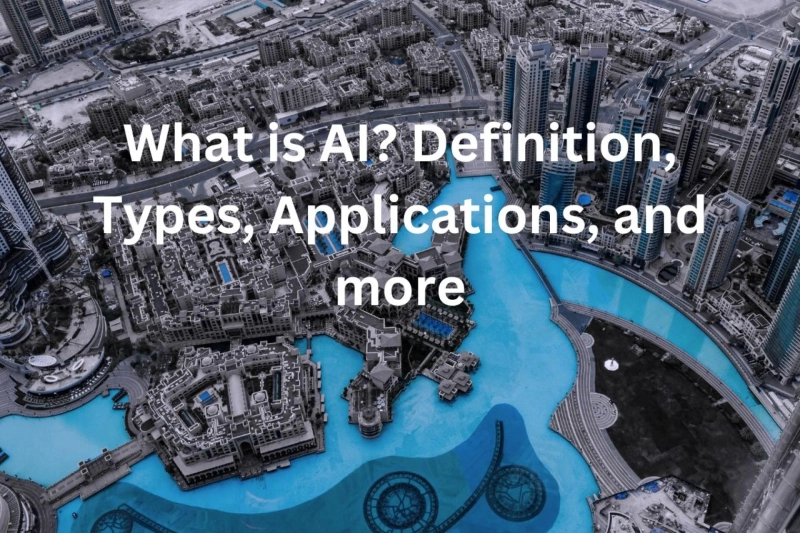What is AI? Definition, Types, Applications, and more
What is AI?
Have you ever heard the term "artificial intelligence" (AI) and wondered what it meant? AI is a type of technology that enables machines to “think” and act like humans. AI can be used to apply humanlike intelligence to tasks such as pattern recognition, language translation, learning, problem solving, and decision making. AI has become increasingly popular over the years due to its potential for solving complex problems across a variety of industries.
At its core, AI is a combination of computer science, mathematics, psychology, linguistics, and philosophy. It is focused on creating computers that have the ability to interpret and respond intelligently to their environment through behaviors that are learned from data. This means that the system can learn from past experiences and become more effective at completing tasks without explicit instructions or programming. As a result, AI offers a range of applications for industries such as healthcare, finance, transportation, manufacturing, retail, education, and many more.
When exploring AI applications further you may come across four major types: Reactive Machines (create models based on existing information), Limited Memory (uses past experiences but does not retain them), Theory of Mind (replicates human emotions and social skills), and SelfAwareness (acknowledges itself). Each type of AI serves its own purpose in different scenarios; for instance Reactive Machines are ideal for tasks such as facial recognition while Theory of Mind is better suited for social assistance robots.
Artificial Intelligence Reviews
Types of Artificial Intelligence
When it comes to types of AI, there are several categories that can be explored. For starters, Weak AI (also known as Narrow AI) is limited in its scope and capabilities as it was designed for a specific task. Weak AI systems rely on deep learning algorithms which allow them to analyze data in order to come up with predictions or recommendations relevant to a particular task or application. A good example would be virtual personal assistants such as Apple’s Siri or Amazon’s Alexa, which are programmed to recognize voice commands and respond accordingly.
On the other hand, we have Strong AI (also known as General AI), which is meant to replicate human intelligence across multiple fields. In contrast to Weak AI, Strong AI systems are capable of understanding abstract concepts and reasoning logically about them based on past experience or external information. Although this technology is still in its early stages of development today, it holds immense potential for future applications such as autonomous vehicles and robotics.
In addition, there are also hybrid forms of AI like Augmented Intelligence which combine both Weak and Strong forms of Artificial Intelligence into one system that can better represent human intelligence. Augmented Intelligence systems typically have access to many different sources of data and use machine learning models for predictive analytics which allow them to adjust their behaviors according to situational changes in order optimize outcomes for users.
Advantages a business analyst reviews Disadvantages of AI
One advantage of AI is its ability to automate processes quickly and accurately while also reducing manual labor costs. This can help businesses optimize their operational efficiency while freeing up employees to focus on more complex tasks. Furthermore, advancements in AIbased technologies have enabled faster decision making by accounting for large datasets in real time. As a result, decisions can be made quicker and with higher accuracy than humans could ever achieve.
On the other hand, there are certain limitations of AI that need to be considered when implementing it into a business or organization. For starters, the development costs associated with developing an AI system can be expensive due to the complexities involved such as collecting data sets, training algorithms and adapting them accordingly over time. Additionally, safety issues such as autonomous vehicles crashing or facial recognition systems misidentifying people could lead to serious legal implications if not properly addressed in advance.
The ethical implications of using artificial intelligence also come into play here as well since AI systems are essentially taking decisions away from humans which could lead to inequality among people in society if left unchecked. Finally, ensuring data security is paramount with any type of technology involving computer systems. One malicious activity or mishandling could lead to serious consequences both domestically and internationally.
Impact of AI on Society
There are many different types of AI, such as rule based systems, natural language processing, machine learning, deep learning, and more. Each type of AI applies different techniques to solve complex issues and analyze data. For example, natural language processing can help machines understand human speech or written text and provide corresponding responses.
AI is being implemented in many industries including banking, healthcare, education, transportation, retail, agriculture, security, manufacturing and more. It allows us to automate manual processes such as customer service inquiries or intelligent marketing campaigns. AI is also being used to streamline operations in hospitals to provide more accurate diagnoses or even detect cancer cells faster than before. Additionally, AI applications are playing an important role in autonomous vehicles where they use gathered information about the environment to make decisions and take action accordingly.
The impact of AI on society is undeniable; it has changed our lives for the better in countless ways and has become essential for many daily operations. AI has simplified many tedious tasks while also providing more accurate results than ever before. As its applications become more advanced and widespread across various industries, so too does its potential for improving lives everywhere in an increasingly digital world.


